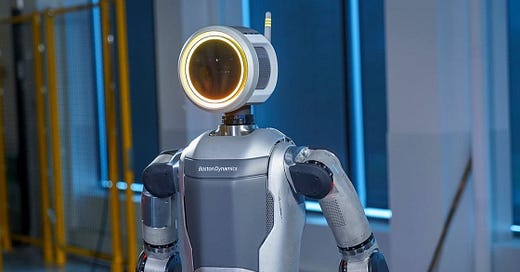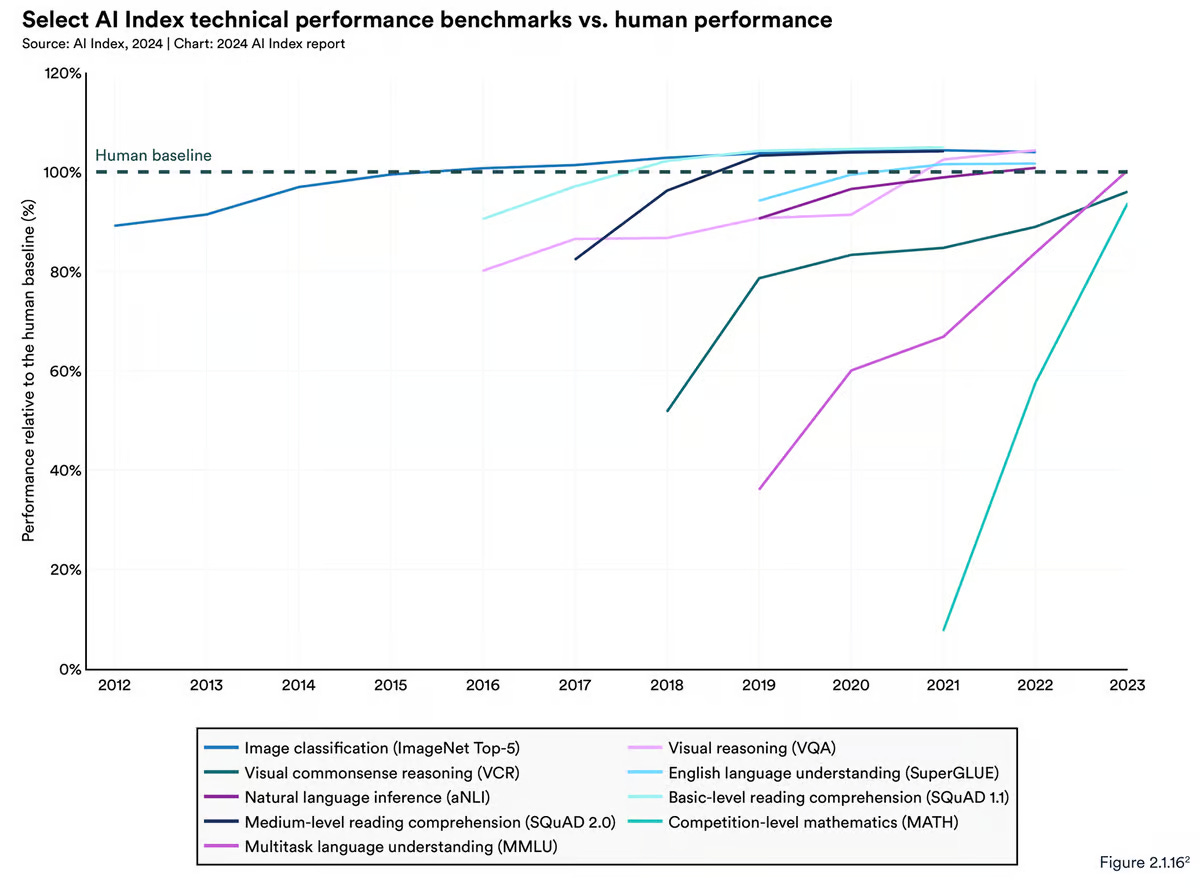🚀Latest cool robot videos, Zuck's & Musk's last thoughts on AI & more
Hi,
This is Thomas, co-founder and CEO of digital agency KRDS, we have offices in Singapore, HK, Shanghai, Dubai and India. I’m also a co-founder of The WeChat Agency and Yelda.ai (more about me at the end).
You're receiving Future Weekly, my personal selection of news about some of the most exciting (and sometimes scary) developments in technology 🤖 summarized as bullet points to help you save time and anticipate the future 🔮.
First, you'll find small bites about many different news, and then further down these summaries:
China: how high-profile crackdowns mask the symbiotic relationship between tech companies and the government (MIT Tech Review)
How Generative AI can turn your most precious memories into photos that never existed (MIT Tech Review)
How Chinese mourners turn to AI to remember and ‘revive’ loved ones (The Guardian)
Small Bites
Boston Dynamics Says Farewell to Its Humanoid Atlas Robot—Then Brings It Back Fully Electric
Hydraulic Atlas is retiring... 😢 Watch the video
... say hello to fully electric Atlas... 🤖 Watch the video
Old Atlas’ antiquated hydraulics have been jettisoned in favor of electric-powered actuators. Old Atlas moved like a clunky chunky human; the latest iteration swivels and turns like a freaky crab crossed with an unfeasibly double-jointed contortionist.
With the Old Atlas, we could comfort ourselves with the notion that clever editing meant Atlas wasn’t as self-righting over rough ground as the original viral videos portrayed. However, the last video might well resurrect any robot overlord fears you may have since suppressed. This thing is scary, and not just because it has a ringlight for a face.
Hyundai—which bought Boston Dynamics in 2020, valuing it at $1 billion—could soon set Atlas to work in its car factories.
100 billion, 100 milliards, a symbolic number!
Approximate number of stars in the Milky way, number of neurons in our brain, and number of humans who have ever lived so far
Bangladesh is more populated than Russia😯 (Twitter)
China installed 6X more industrial robots than China in 2022 (source)
"Production capacity is what wins wars. If US can’t automate faster than China, competing will become rapidly more difficult"
“China is heavily investing in munitions and acquiring high-end weapons systems and equipment 5 to 6 times faster than the U.S." (source)
"China is also the world’s largest shipbuilder & has a shipbuilding capacity that is roughly 230 times larger than the U.S.”
Just a year ago, the average new EV sold in the US commanded a hefty $10k premium over the market average; now, that difference has shrunk to a mere $5k. The total cost of ownership of EVs is close to competitive with or lower than that of Internal Combustion Engine vehicles.
Mind Blowing Machine Generating Surfing Waves in a Lake: watch the short video
Groundbreaking ‘blended-wing’ demonstrator plane cleared to fly (CNN)
“the blended wing airframe can deliver 50% lower fuel burn and emissions,”
JetZero’s new milestone brings it a little closer to its ambitious goal of putting into service a blended wing aircraft as soon as 2030.
Mark Zuckerberg: "Another bias that people tend to have is thinking that intelligence is somehow kind of fundamentally connected to life and it's not actually clear that it is" (youtube)
Elon Musk: “My guess is that we’ll have AI that is smarter than any one human probably around the end of next year” (Financial Times)
"Within the next five years, the capabilities of AI will probably exceed that of all humans"
Devin, an AI unlike any other commercially available today. Devin is an “AI software engineer” with access to the internet, and the ability to use it just like a person would. Whereas today’s AIs merely give advice, Devin takes action.
At one point in his experimentation, Mollick instructed Devin to figure out how to create an account on Reddit, then offer to answer coding questions. Not only did the AI manage this feat, but it also spontaneously began demanding $50 to $100 an hour for its work, and writing back to real humans (source)
Anthropic CEO Says That by Next Year, AI Models Could Be Able to “Replicate and Survive in the Wild” (source)
Amodei is a serious figure in the space. Back in 2021, he and his sister Daniela left OpenAI over directional differences following the creation of GPT-3 — which the CEO and cofounder helped build — and the company's partnership with Microsoft. Soon after, the siblings founded Anthropic along with other OpenAI expats to continue their responsible scaling efforts.
something like AGI is something like 3-24 months away, and will happen almost through scale
In the meantime, research confirms that AI models routinely made factual mistakes and errors of omission when asked to summarize long documents. (Washington Post)
Another recent paper suggested that a claim that AI was better than the vast majority of humans at writing bar exams was exaggerated.
Google's definition of an AI assistant (source)
We have defined an AI assistant as an artificial agent with a natural language interface, the function of which is to plan and execute sequences of actions on the user’s behalf across one or more domains and in line with the user’s expectations. In particular, AI assistants differ from other kinds of AI technologies given their agency and social orientation. Here, agency consists in the ability to act autonomously within the purview of user-specified goals, and social orientation consists in the ability to engage conversationally with users in natural language.
“a senior person at a well-known A.I. startup” whose p(doom) was 50% (probability that everything will end in disaster). (New Yorker)
If you truly believe that A.I. has a coin-toss probability of killing you and everyone you love, Nielsen asked, then how can you continue to build it?
The person’s response was “In the meantime, I get to have a nice house and car.”
How text-to-image generation has improved with progressive versions of MidjourneyMidjourney/AI Index 2024
AI now surpasses humans in almost all performance benchmark (source)
It's worth noting that the results below reflect testing with these old, possibly obsolete, benchmarks. But the overall trend is still crystal clear
A Microsoft AI model can create a deepfake video of a person talking or singing with one photo and one audio track (see examples here)
Tech Exec Predicts Billion-Dollar AI Girlfriend Industry (source)
The NY Times will offer AI-powered audio versions of most of its articles. (source)
You can now play with Suno, a startlingly impressive music generation model.
15 Graphs That Explain the State of AI in 2024 The AI Index tracks the generative AI boom, model costs, and responsible AI use (source)
US Air Force Confirms First Successful Dogfight (bataille aérienne) between AI and human (source)
DARPA doesn’t say which aircraft won the dogfight, however.
Elon Musk just gave another Mars speech—this time the vision seems tangible (Twitter, Ars Technica)
"These are unthinkable numbers, but we’re not breaking any physics to achieve this."
Elon Musk: "The odds of catching the Starship booster with Mechazilla arms this year: 80-90%" (Would look something like this: watch the 1-min video)
There will be a Starship adapted to land on the Moon as per the Artemis program by NASA
Starship will also get bigger, primarily by expanding its length. Musk outlined the company's plans for a "Starship 3," with a capacity of 200 or more tons.
The final Starship 3 vehicle will be about 150 meters tall, about 20% larger than the current vehicle.
Musk said the company should be able to launch Starships for less than the original price of the Falcon 1 rocket, which was $6 million. Starship would carry 400 times the payload, however.
A search by ChatGPT may consume ten times the electricity of googling (The Economist)
Rene Haas, chief executive of Arm, a chip-design company, told the Wall Street Journal this week that by the end of the decade AI data centres could consume as much as a quarter of all American electricity, up from 4% or less today.
About bioterrorism... (Wired)
There's a lot of vulnerability that remains in society. Covid was a demonstration of this. This was a relatively mild virus in historic terms—it had an infection fatality rate less than 1% —whereas there are some natural viruses that have fatality rates well above 50%. There are synthetic viruses that have close to 100% lethality while still being as transmissible as SARS-CoV-2.
Even though we know how to design vaccines and manufacture them very quickly, getting them approved takes about as much time today as it did about 20 years ago. So the amount of time that you would need in order to vaccinate a population is about the same today as it was for our parents and even for our grandparents.
When I first started getting interested in biosecurity in 2002, it cost many millions of dollars to construct a poliovirus, a very, very small virus. It would've cost close to $1 billion to synthesize a pox virus, a very large virus. Today, the cost is less than $100,000, so it's a 10,000-fold decrease over that period. Meanwhile, vaccines have actually tripled in cost over that period. The defense-offense asymmetry is moving in the wrong direction.
Old robots : a 1-min video from 1957, two large robotic arms are dexterous enough to pinch a cigarette, place it in the mouth of a woman at a typewriter, and reapply her lipstick.
...but the intelligence and the spatial awareness of that robot came from the person who was operating it.
Finding this interesting? Share it on Whatsapp, just click here ❤️
If yes, feel free to take 3 seconds to forward that newsletter to one person, or share it on Whatsapp clicking here, I'd be immensely grateful.
If that email was forwarded to you, you can click here to subscribe and make sure to receive future editions in your mailbox (many CEOs and startup founders are subscribers)
More to chew!
China: high-profile crackdowns mask the symbiotic relationship between tech companies and the government. (MIT Tech Review)
for example, Chinese local courts spend tremendous judicial resources helping tech firms resolve online disputes.
In a six-year span from 2016 to 2021, three local courts in the southern city of Guangzhou processed over 130,000 cases where the Chinese fintech company Lakala sued its users for defaulting on microloans
the court was essentially turned into an outsourced dispute arbitrator for the company. And the result? Lakala won almost all the cases.
Generative AI can turn your most precious memories into photos that never existed (MIT Tech Review)
Maria grew up in Barcelona, Spain, in the 1940s. Her first memories of her father are vivid. As a six-year-old, Maria would visit a neighbor’s apartment in her building when she wanted to see him. From there, she could peer through the railings of a balcony into the prison below and try to catch a glimpse of him through the small window of his cell, where he was locked up for opposing the dictatorship of Francisco Franco.
There is no photo of Maria on that balcony. But she can now hold something like it: a fake photo—or AI-powered memory-based reconstruction of the scene that a real photo might have captured..
The fake snapshots are blurred and distorted, but they can still rewind a lifetime in an instant.
“It’s very easy to see when you’ve got the memory right, because there is a very visceral reaction,” says Pau Garcia, founder of Domestic Data Streamers. “It happens every time. It’s like, ‘Oh! Yes! It was like that!’”
One thing they did discover in the pilot was that older people connected with the images much better if they were printed out. “When they see them on a screen, they don’t have the same kind of emotional relation to them,” says Garcia. “But when they could see it physically, the memory got much more important.”
The researchers have also found that older versions of generative image models work better than newer ones. They started the project using two models that came out in 2022: DALL-E 2 and Stable Diffusion, a free-to-use generative image model released by Stability AI. These can produce images that are glitchy, with warped faces and twisted bodies. But when they switched to the latest version of Midjourney (another generative image model that can create more detailed images), the results did not click with people as readily.
“If you make something super-realistic, people focus on details that were not there,” says Garcia. “If it’s blurry, the concept comes across better. Memories are a bit like dreams. They do not behave like photographs, with forensic details. You do not remember if the chair was red or green. You simply remember that there was a chair.”
Dozens of people have now had their memories turned into images in this way via Synthetic Memories, a project run by Barcelona-based design studio Domestic Data Streamers.
Chinese mourners turn to AI to remember and ‘revive’ loved ones (The Guardian)
The Taiwanese singer Bao Xiaobai used AI to “resurrect” his 22-year-old daughter, who died in 2022.
Despite having only an audio recording of her speaking three sentences of English, Bao reportedly spent more than a year experimenting with AI technology before managing to create a video of his daughter singing happy birthday to her mother, which he published in January.
“People around me think I’ve lost my mind,” Bao said in an interview with Chinese media. But, added: “I want to hear her voice again.”
Previous newsletters:
How a missing gene in our DNA affected the Battle of Trafalgar and gave birth to the Mafia
Superhuman: see how much work a professor did in 30 minutes with AI, + more gems about the future
That's it for this week :)
If you made it until here, well, thanks a lot for reading this newsletter! A very simple way to encourage me to continue doing this is to take a few seconds to:
transfer this to one curious friend, or share it on Whatsapp clicking here
click on the little star next to that email in your mailbox
click on the heart at the bottom of that email
Thank you so much in advance!
Here to subscribe to make sure you get the future editions if this one was forwarded to you.
More about me
I cofounded KRDS right after college back in 2008 in Paris, we now also have offices in Singapore, HK, Shanghai, Dubai and India, we're one of the largest independent digital agencies in Asia. More here.
Watch our latest game showreel: At KRDS, we take pride in designing and developing games from scratch for brands and organizations, big and small! Gamification has always been part of our DNA, since our early days creating viral apps on Facebook back in Paris as the very first Facebook marketing partner outside of the USA!
I also run The WeChat Agency for the Chinese market (the Government of Singapore Investment Corporation, GIC, is a client)
I’m the cofounder of Yelda.ai, which deploys voice AIs able to answer customers and prospects calling your company on the phone using natural language.
I also write op-eds and do podcasts at times. Here are my latest articles and podcasts, and here my last episode on the Abundance Makers podcast, interviewing one of the most promising clean tech CEOs in the US.
For the French speakers, I’ve written more than 50 articles on the future of technology over the past years, all can be found listed here.
Have a great weekend :)
Thomas








